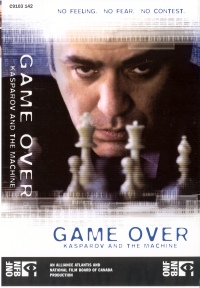| ________________
CM . . .
. Volume XI Number 11 . . . .February 4, 2005
Game Over is a feature documentary which attempts to uncover the events behind the 1997 chess match between Garry Kasparov and Deep Blue, IBM's super computer. At one time, Garry Kasparov was regarded as the greatest chess player the world had ever seen. In a game of grand masters, some believe that there should simply be a category for Kasparov alone. As a 17-year-old, he defeated older players in such an aggressive way that some refused to ever play him again. In May 1997, Kasparov agreed to challenge Deep Blue, IBM's one-and-a-half tonne supercomputer. In six games over nine days, Deep Blue beat Garry Kasparov. Ideologically, the film aligns itself very much with films like Bowling for Columbine and The Corporation for it is clear that Deep Blue is not the only machine that Kasparov was up against. IBM was, itself, a big faceless machine, one that was able to control the media around the event, the game, and, even in some cases, Kasparov's agent who was not allowed entry to Kasparov's dressing room. Those interviewed from IBM come away looking smug and in some cases a little slippery. Did IBM act ethicially in the match with Kasparov? The film interviews various insiders including IBM employees in an attempt to find the answer. The film suggests that it wasn't so much that Deep Blue won, but that Kasparov lost. But what is not clear is what role IBM played in Kasparov's losing. After a loss in game two, Kasparov becomes suspicious of the machine, convinced that human imput went into Deep Blue's win, that no computer could play as it did. As his suspicious grows, so does his fatigue. By game six, Garry Kasparov, according to one observer, "lost in a very human way." He seemed to collapse psychologically and played so badly as a result that "it was as if a baseball player came up to bat holding the wrong end of the bat." It is suggested that, while IBM's playing on Kasparov's suspicions may have started accidentally, they continued purposefully when they realized what an effect they were having. The chess match had become a death match. For those watching, the outcome was not one for celebrating. Even after losses, Kasparov received a standing ovation from the audience while the expert team assembled by IBM was booed. After the sixth and final game, IBM PR told the team not to smile during the press conference during which Garry Kasparov conceded defeat. Kasparov always felt that in game two there was human input in Deep Blue's playing -- that perhaps the human operator encouraged the machine to choose one move over another. However, IBM refused to ever disclose the logs that Kasparov requested that might have shed light on this. The film raises questions but provides no concrete answers, just suspicions. Deep Blue was dismantled shortly after this game. Why was this? If the idea was to further science's quest in man vs. machine, why dismantle this supercomputer that might have told science so much? What is clear is that IBM benefitted enormously from the match. The company apparently made more that $100 million dollars from the rise in stock and branding that occurred after the match. Is this why Deep Blue was dismantled? Did they simply have nothing more to gain from continuing their research or were they hiding something? While the back of the video suggests that Kasparov was in a "paranoic mindscape," there seems much to support his suspicions, including a journalist employed by IBM who was heavily censored in his coverage of the games. The film would have benefitted from tighter editing. It jumps around and can be very hard to follow. (Disclosure: I watched this film with a computer scientist who also writes programs allowing computers to play games against humans and relied on him often for background information or for clarification.) Even so, a second viewing was necessary to get all the details straight as the film had so many other little clips not related to the match. The film opens with an anecdote about "The Turk," a "machine" that defeated Napoleon in chess. Later the machine was found to contain a midget. While this is a great anecdote and connects thematically, hokey bits meant to remind the watcher of Napoleon's own match against "The Turk" are overdone and become annoying if not downright distracting. I felt the whispering interspersed throughout the film, supposedly to suggest Kasparov's state of mind, was also confusing rather than cinematically useful. As well, some dialogue is hard to catch. Overall, this is an excellent thought-provoking film that will be a must-see in the chess world as well as with the general public interested in an intriguing story. The views presented seem balanced as the film is neither a fawning portrait of Kasparov nor a complete condemnation of IBM. It raises some very interesting questions that viewers may well feel the need to research further. While this match is over, the game between corporations and individuals may have just begun. Highly Recommended. Liz Greenaway has worked in bookselling and publishing and has not played chess since grade four. She lives in Edmonton, AB.
To comment
on this title or this review, send mail to cm@umanitoba.ca.
Copyright © the Manitoba Library Association. Reproduction for personal
use is permitted only if this copyright notice is maintained. Any
other reproduction is prohibited without permission.
NEXT REVIEW |
TABLE OF CONTENTS FOR THIS ISSUE
- February 4, 2005.
AUTHORS |
TITLES |
MEDIA REVIEWS |
PROFILES |
BACK ISSUES |
SEARCH |
CMARCHIVE |
HOME |
